After coming to China for the first time in the year 2000, the French musician Djang San has cultivated quite the following with his brand of ‘folk rock.’ It blends elements of traditional Chinese music with his own personal influences of rock and electro. His pioneering electrical use of Chinese instruments, like pipa, guzheng and zhongruan, made the man from Bordeaux a unique addition to Beijing’s underground scene, and now, more than 60 releases and countless projects later, he’s getting thrust into a new challenge.
The 41-year-old recently relocated from the capital to Kunming, Yunnan province, some 2,500 kilometers away, in 2021. In April of this year, he was offered a rare opportunity from the French Consulate in Chengdu to collaborate with the Dayan Naxi Orchestra of Lijiang (also in Yunnan).
“I wasn’t sure what to think about it in the beginning,” Djang tells That’s. “I had heard about the orchestra because they were very famous in the eighties and nineties. They went to a lot of countries including England, Norway and France. So, knowing I was in Kunming and needing a new challenge, I told myself; I’m going to do it! The idea is to create music with them and it’s a challenge because most of them are over 70.”
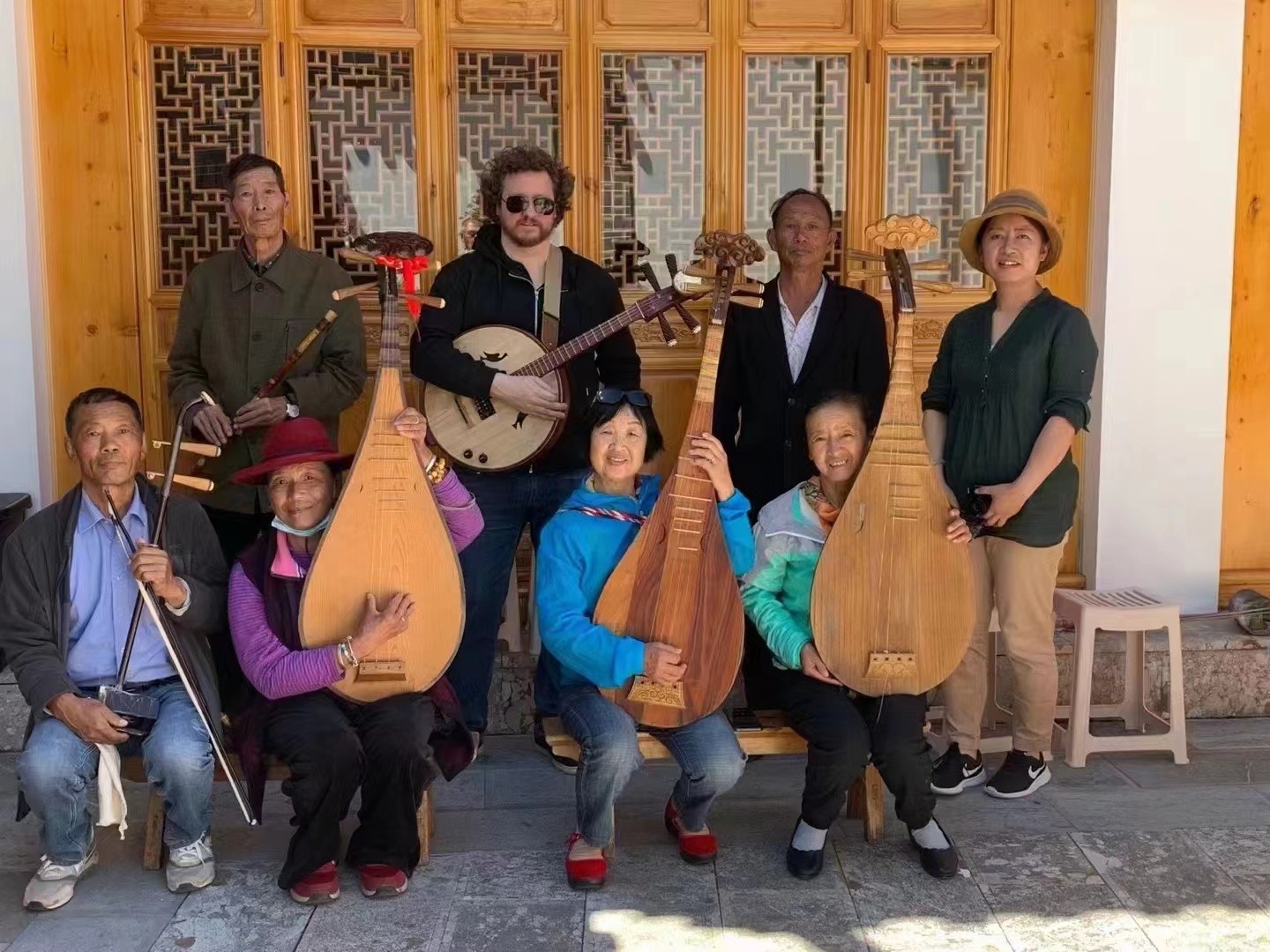
Djang San and the orchestra showing off their ancient Chinese instruments.
When we think about orchestras, the image of an impressive symphony hall with musicians reciting classic pieces from the ages is the most common one. The China NPCA Orchestra in Beijing regularly performs contemporary compositions by Chinese composers as well as more well-known movements from the likes of Dvorak, Bach and Beethoven. The players in Lijiang take a more organic approach, with their resources much less funded and a repertoire that resonates particularly with the area of its origin.
Xuan Zhi Lian is the daughter of founder, Xuan Ke. She explains how the group has found a new lease on life since being reformed.
“We call it a living fossil of music. It’s a remarkable part of Naxi culture and it doesn’t only include our (the Naxi) own traditional folk tunes but it also has a long history, dating back to the Ming Dynasty (1368-1644). In 1981, it was revived by Mr. Xuan Ke and four years later we had our first public performance. Since then, the orchestra has performed in more than 20 countries.”
“If the tree’s roots are deep into the soil, the tree will not fall.”- Old Naxi proverb
For the past 42 years, this band of 15 has been reviving their music. In their 400-seat theatre, there is no sheet music in sight but a generational knowledge of their craft, something their new collaborator wants to tap into.
Born Jean-Sébastien Héry, the stage name Djang San has its roots in the way his Chinese teacher would pronounce Jean-Sébastien. An endearing start to a persona that has gone on to be a staple on stages across the county. This latest project would take him away from the buzz of a live audience and instead be a chance to delve into an aspect of Chinese music rarely explored by those from overseas. Expats will always experience levels of cultural differences, no matter the length of their stay, but being asked to collaborate with a small ethnic minority is an esoteric level.
“They perform music that has more than 400 years of history,” he says. “There are about 20 to 30 tunes that have survived time. So far, I have composed music for the orchestra based on what they know, adding my own perspective to it.
“They have a theatre in Lijiang on one of the main streets. I go there every morning and talk with the people. Then I usually go and see one of them [the orchestra members] at their house and play music with them and see what and how they play. Some of them sing and some of them play a few different instruments. I jam with them and see what kind of stuff they are into so I can create something out of it.
“Being a foreigner and being dropped into that situation suddenly was not easy. I went to see them one by one at their houses, filming them, asking them questions about how they started music, all that stuff. I asked them what Lijiang was like when they were kids. Apparently, there were no roads, there wasn’t much there at the time and they were all farmers.”
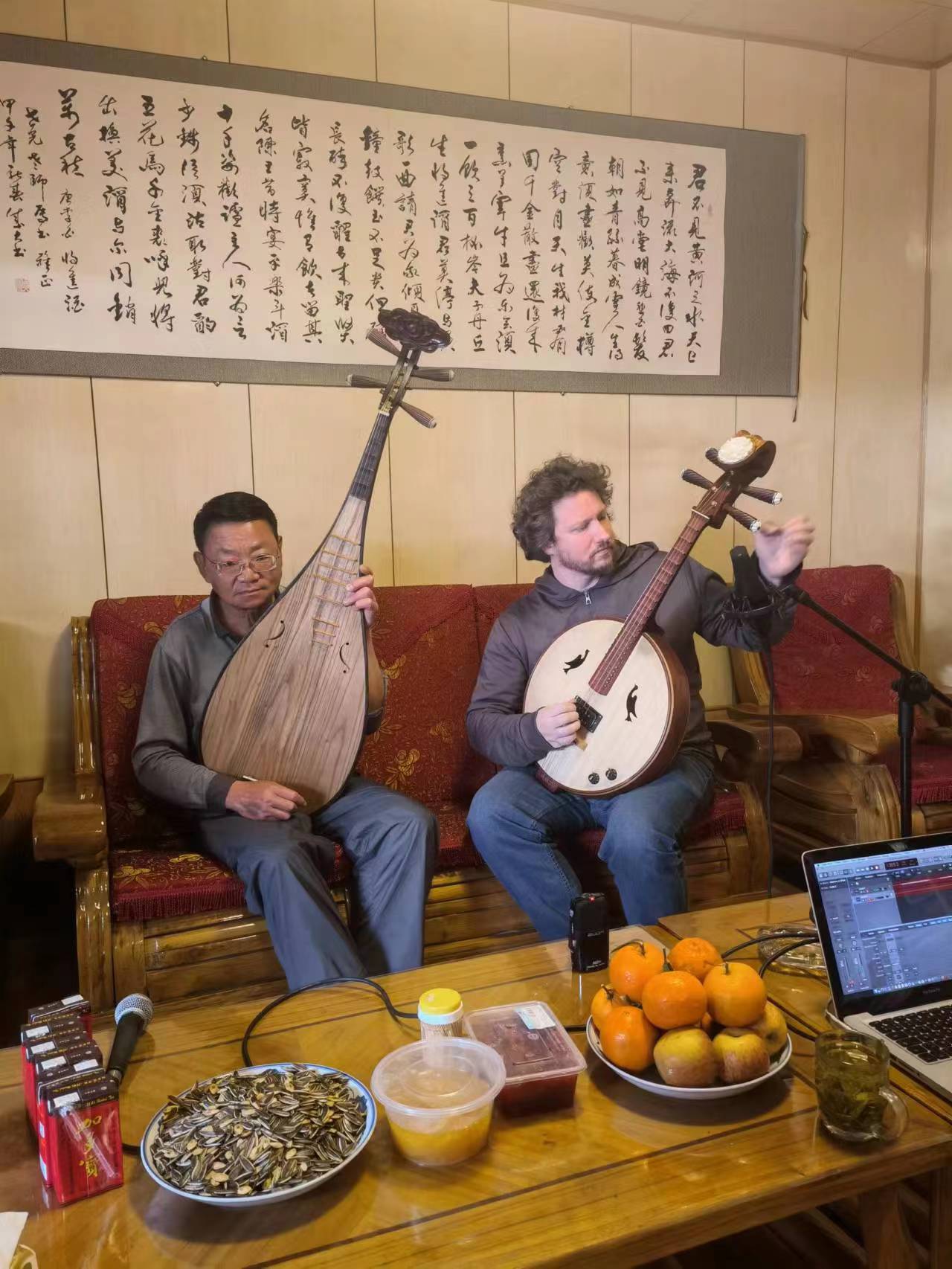
Djang San visiting one of the orchestra members in their house.
As a fluent Mandarin speaker, language barriers don’t prove to be much of an obstacle for Djang. Even the local’s accents when speaking Mandarin and the Naxi dialect didn’t deter any initial icebreaking. However, the language differences started to surface when it came to music.
“I realized that none of them can read western musical notation. They use a way of writing music using numbers which were invented by French philosopher Jean-Jacques Rousseau in the 18th century. It never caught on in Europe, nobody used it. But, because it’s a lot like the way of writing ancient music in China, people in Japan and China started to use that system around the beginning of the 20th century. It became widespread in Chinese classical music and that’s partly how the Naxi Orchestra learns music. One of the musicians has helped me transcribe Western notation into the kind the orchestra use, which has helped.”
A quick search on the internet will produce clips that showcase the orchestra’s complex sound with the players of, let’s say, a vintage age in traditional attire. It is a layered approach that springs images of storytelling and heritage from a minority wanting to preserve its culture in an age where the youth have plenty of distractions. Djang's aim isn't just to collaborate or expand his own knowledge. It is also to produce a more diverse concept that appeals to future generations.
“There was a period in the early 2000s when young people seemed to be kind of disinterested in their culture. Now the theatre tries to get kids from the region and the schools to come and study things about their own culture. You now have a new generation of kids that are starting to get into it again, so it means this culture will not die.”
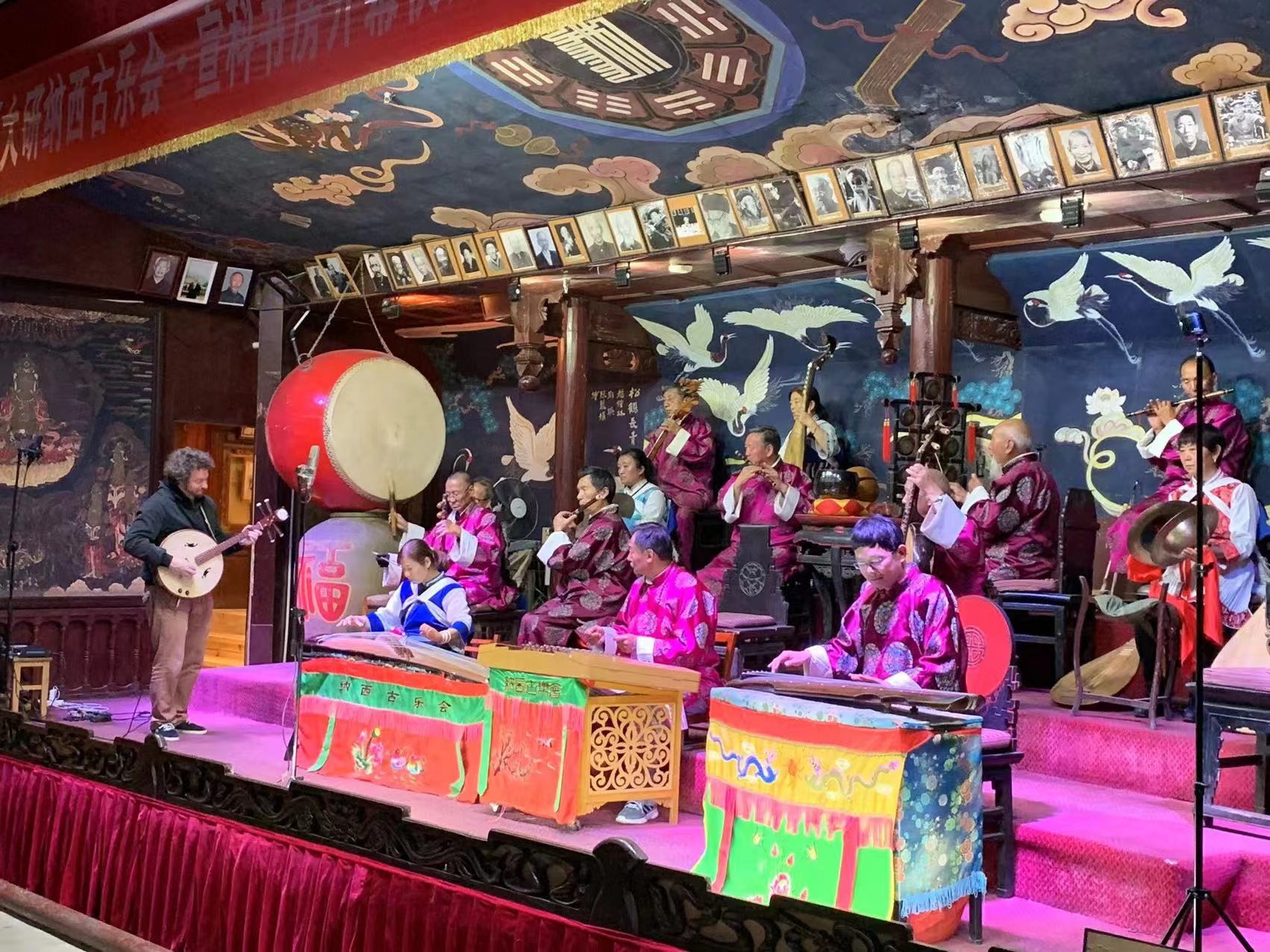
Djang San and the Naxi Orchestra performing in their theatre in Lijiang.
Even for a man with two decades worth of China experiences, the learning curve has been a steep one and excellent spoken Chinese is a minimum requirement for the sessions, which he films and records every time. It’s a music residency with a difference as both parties enter unchartered territory. The French consulate, who specifically wanted a French musician for the project, have chained together an unprecedented link and with the reins firmly in the hands of their number one candidate, the music is starting to take shape in directions no one expected.
“It’s been super interesting for me. I’m grateful I can do this because I think it’s a once-in-a-lifetime opportunity to be able to do this kind of stuff.
“There are some instruments here that they don’t have in other places in China anymore. There is one called the sugudu, from Mongolia. You have an ancient version of the pipa which is from the Tang Dynasty that is not used anywhere else. Because the Naxi people have been isolated for a very long time, they have been able to keep some of these instruments alive. You have a flute that is different from the rest of the country, it’s called a bobo. Also, the way they sing, there are different sides to it. You have the local influence and the outside influence, creating the idea of the past.”
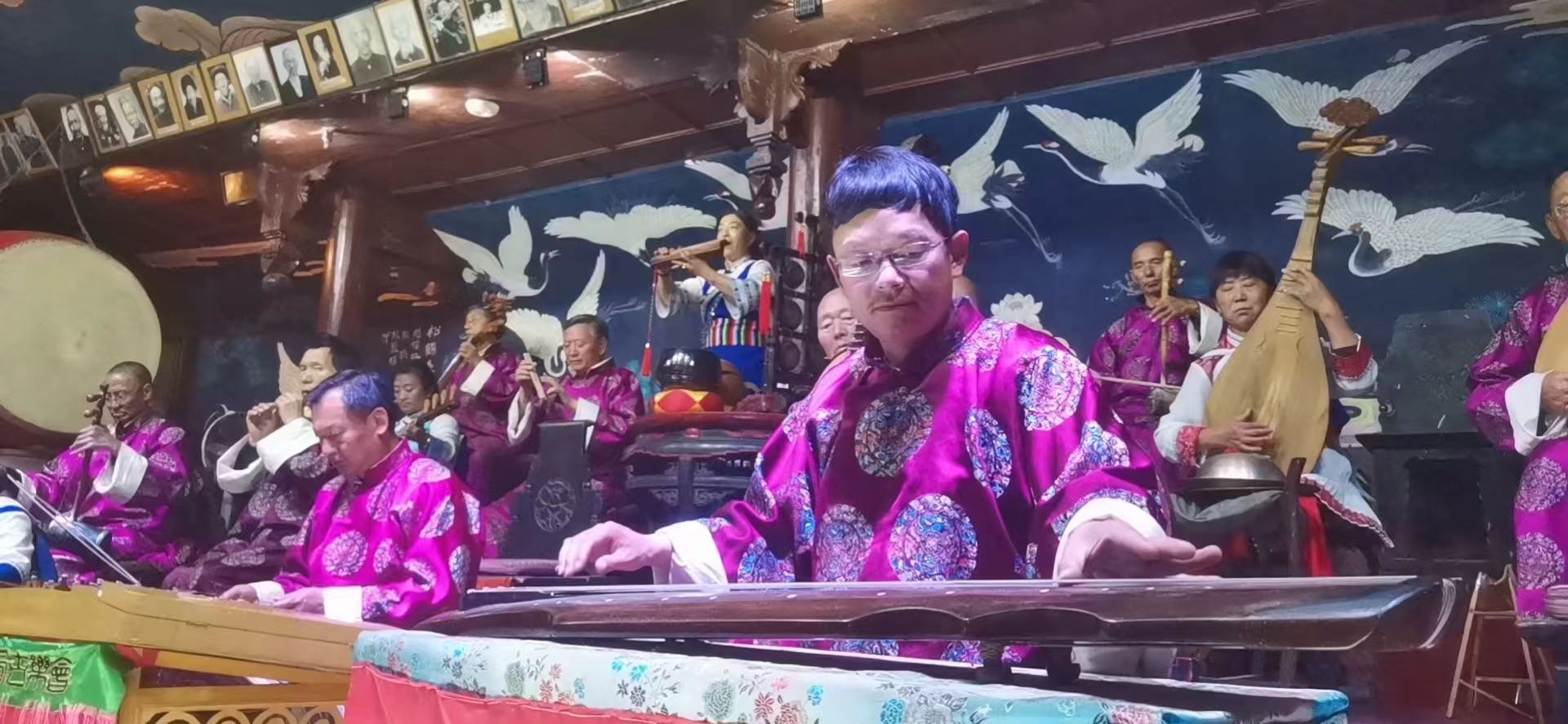
An orchestra member performing one of the ancient instruments.
From the orchestra’s perspective, working with the Frenchman was a daunting experience at the start. Djang’s presence on stage is commanding, yet authentic, and to be thrust into a creative environment with him might have been met with apprehensive feelings. The approach of getting to know the people behind the instruments was certainly valued by his new ensemble, but for the Naxi people, the real appreciation comes with having respect for their culture and way of life.
A minority of around 300,000, the Naxi background is made up of Taoism and Dongba, an ancient cult which has its own pictographic writing system still in use today.
In fact, a close look at Dongba characters will reveal similarities in Mayan, Babylonian and Egyptian hieroglyphics. This ancient prevalence adds another layer of cultural importance for the orchestra, whom themselves are hoping this collaboration can keep up with tradition and add a touch more modern relevance to their music.
Their playing comes with a sense of responsibility, while their performances to tourists are met with acclaim and fascination. Chinese music is well known for being entwined with many years of history and the group’s importance stretches beyond the music. Djang’s mission is far from accomplished with the goal not only to compose something new but also to understand the meanings behind it.
“So far, it’s been good. But I want to make it even better. I have filmed everything and I want to make a documentary,” he says.
“I have to make compromises with them, and I have to understand how they work and where they come from musically and that’s the difficulty that comes with it. But I’m trying to bring them into my world, and they are bringing me into theirs.”
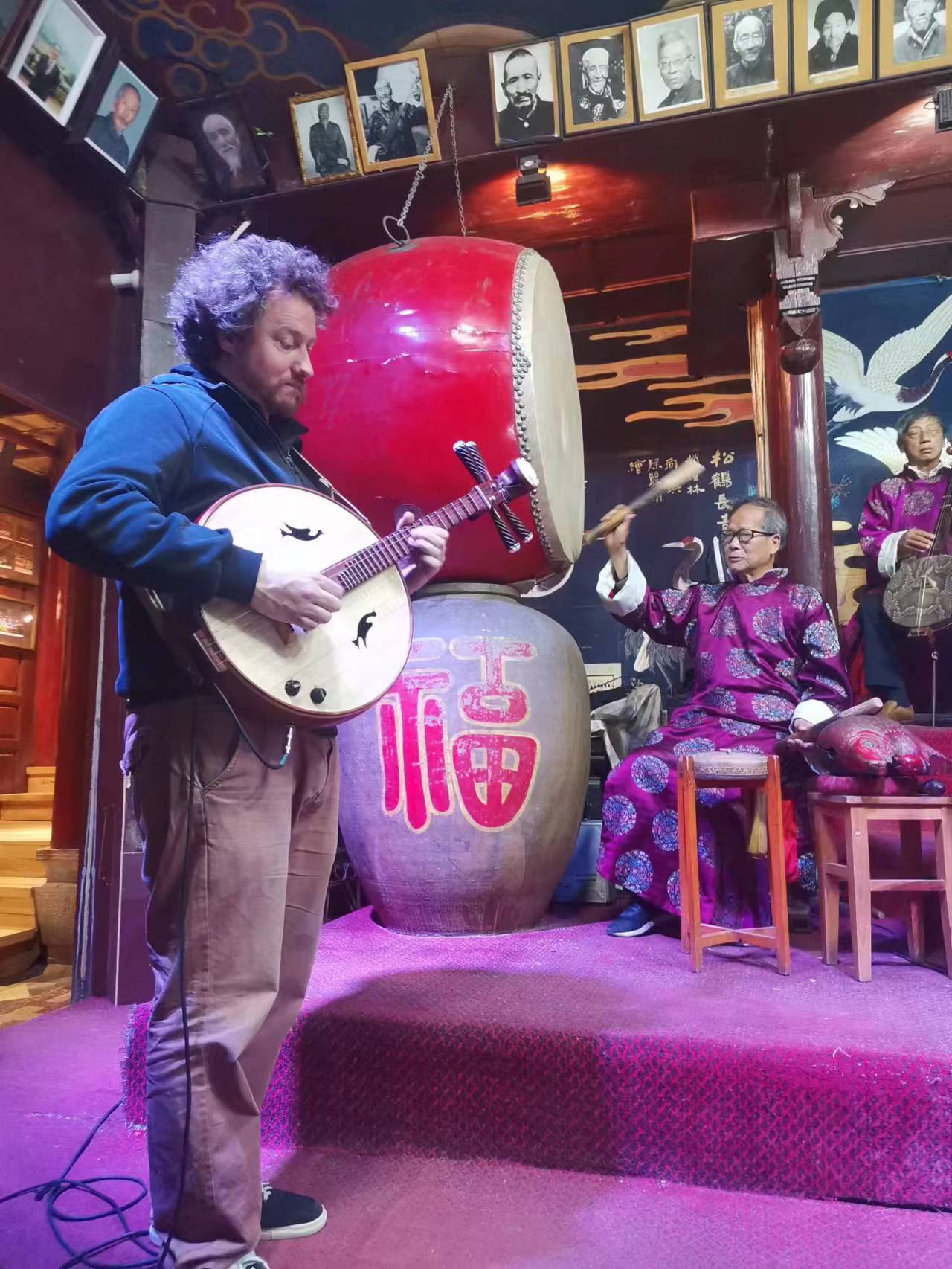
Djang San on stage.
There are plans to release what is filmed and recorded at an unknown date to show off the efforts of the venture. Djang and the orchestra also hope to incorporate each other’s sounds into their music going forward.
For now, Djang seems relaxed as we speak with the backdrop of blue skies in his hotel courtyard. It’s a far cry from the big city and he’s certainly taking a slower approach to life and music than before. The live performance high-energy environment and the exciting feeling of unknown potential when entering the rehearsal space are things musicians at all levels relish. What is happening in that small theatre in Lijiang is going deeper than producing sounds, it's building friendships and exchanges that are not just cultural.
The project has an almost contradictory goal; to preserve and evolve music that is centuries old, an aim which is bound to have difficulties along the way. However, as both Djang and the orchestra are proving, no matter how complicated the approach or result might be, the message is a simple one; the soul of any art will always be alive with a willingness to adapt, and the message of the past will always be heard with a willingness to listen.
[Images via Djang San]






















0 User Comments